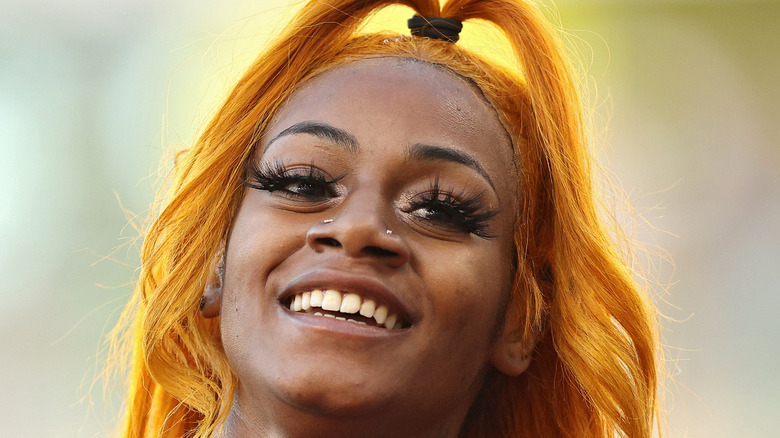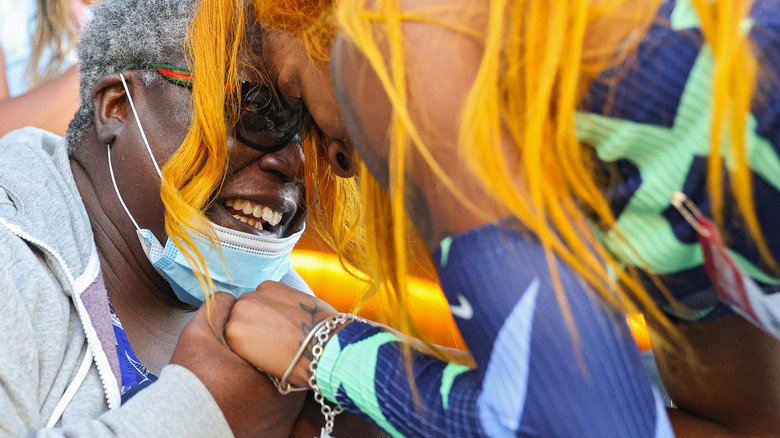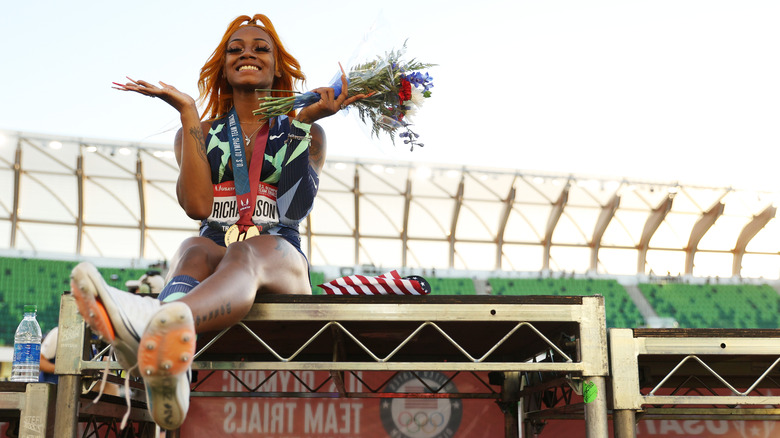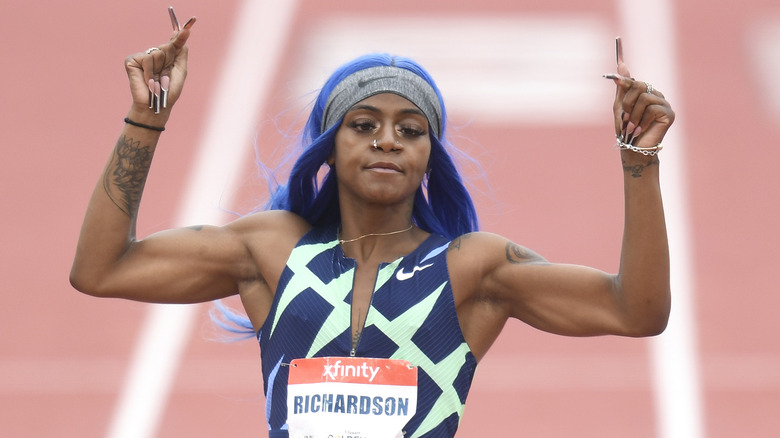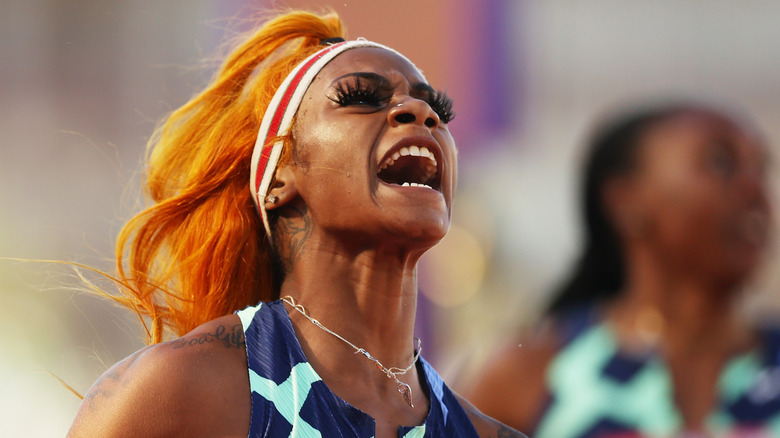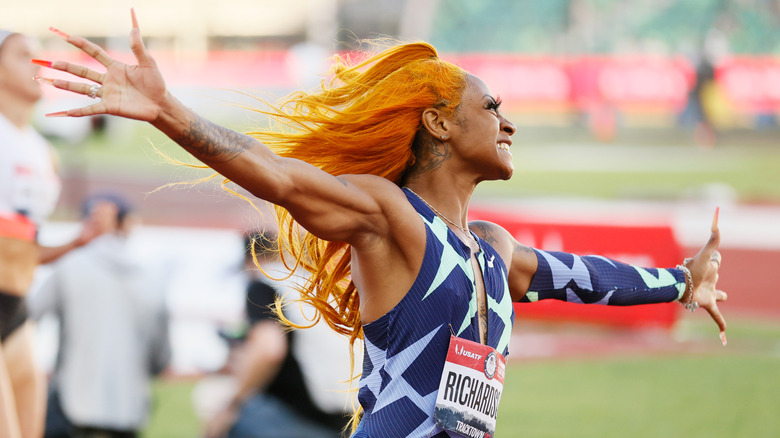The Untold Truth Of Sha'Carri Richardson
The sporting world was stunned when the U.S.' prime Olympic hopeful for the 100-and-200-meter dash, Sha'Carri Richardson, recently tested positive for marijuana use. She was suspended for a month, starting on June 28, denied a spot on the US Olympic Team, as The New York Times reports, and has since watched her Olympic dreams fall apart, all because she used pot to calm down after the death of her mother.
"I was definitely triggered and blinded by emotions, blinded by badness, and hurting, and hiding hurt," the CBC quotes. She continued on CNN, "I just want to take responsibility for my actions. I know what I did, I know what I'm supposed to do, I'm allowed not to do and I still made that decision. I'm not making an excuse or looking for any empathy in my case." While Richardson has stepped up and acknowledged her choices, she's also been admirably defiant of critics and armchair moralists. The Sun reports her saying, "Who am I to tell you how to cope? Who am I to tell you you're wrong for hurting?" and, "Don't judge me, because I am human... I just happen to run a little faster."
For their part, USA Track & Field (USATF) has stated, per Yahoo News, "First and foremost, we are incredibly sympathetic toward Sha'Carri Richardson's extenuating circumstances and strongly applaud her accountability," continuing (also per Yahoo News), "[O]ur credibility as the National Governing Body would be lost if rules were only enforced under certain circumstances."
She was raised and inspired by her grandmother
Richardson was born in 2000 outside of Dallas, Texas, a fact she proudly proclaims in her Instagram profile: "Dallas Raised so Respect the game." As HAQ Express reports, her family constitutes a "very, very, very confusing and sensitive topic," especially when it comes to her biological mother. Richardson was raised by her grandmother, Betty Harp, and aunt, track-and-field medal-winner Shayaria Richardson, whose medals adorned her grandmother's house when Richardson was growing up, as the Olympics site says.
It was Richardson's grandmother who encouraged her to follow in her aunt's footsteps and pursue track-and-field as a profession. As US Magazine quotes Richardson saying during a press conference after her June 2021 Olympic trials, "My grandmother is my heart, my grandmother is my superwoman. To be able to have her here, at the biggest meet of my life, and being able to run up the steps and knowing that I'm an Olympian now... Honestly, that probably felt better than winning the race itself." She continued, "Without my grandmother, there would be no Sha'Carri Richardson. So my family is my everything. My everything until the day I'm done."
Richardson carried this inspiration with her to Louisiana State University (LSU), where she joined the LSU Lady Tigers track-and-field team. "Whenever it comes, it comes," as she said on World Athletics, "but I'm most definitely wanting to make history. Wanting to let everybody know that every time I step on the track, there's going to be history made."
A world record-breaking university student
Folks might be surprised to learn that Richardson only went through one year at LSU before graciously thanking her coaches, family, and friends, and declaring that she was leaving to "pursue [her] lifelong dream and become a professional athlete," as World Athletics quotes. In so doing, along with world pole vault silver medalist Mondo Duplantis, she became the first track-and-field athlete to leave LSU after only her freshman year. "I knew that to get to the next level I had to make myself uncomfortable," she said to Team USA, "meaning push myself to a limit I hadn't pushed myself to before."
In the short time she was at LSU, though, and in the years leading up to starting college, Richardson was already breaking records and landing in the globe's top ten for women's 100-meter dash times. In 2019, she broke the 30-year old NCAA world record for athletes under 20 with 10.75 seconds on the 100-meter dash. Within 45 minutes the "fastest girl in Texas" broke another world record on the 200-meter dash with a 22.17-second run, even though she got second-place (her competitor, Anglerne Annelus, leaned towards the goal ahead of her.)
Even before these victories, Richardson won national competitions in 2016 and 2017, when she placed first at the 100-meter dash at the 2016 US Amateur Athletic Union (AAU) Junior Olympics in Houston, and then at the USA Track & Field (USATF) Junior Championships, per the Olympics site.
Her hair color are nails are intentional choices
Without a doubt, Richardson understands the importance of appearance and psychological warfare in combating not only her opponents and the circumstances of a sprint but herself. Her hair and nails, in particular, have helped her stand out and add to her already spunky public persona. She said of the virulent yellow-orange she chose for the Olympic trials, per US Magazine, "My girlfriend picked this color because it's loud and, honestly, dangerous. She said you need to look the best and be the best." In a general sense, Richardson also said, "The color is based off how I want to feel. Like, the red puts me in a very dominating mood. And sometimes I feel that can be overwhelming, so when I need to calm down I have black hair. The black calms me and makes me blend in instead of being extra."
As for her nails, she said, "If the amazing Flo-Jo had long nails, there was no excuse why I couldn't have long nails." Indeed, in addition to Richardson's physical prowess, her nails — and loads of charisma — have inspired comparisons to Florence Griffith-Joyner, one of the greatest track-and-fielders of all time. Richardson admires Flo-Jo and Wilma Rudolph alike, saying, "Those two were the mix of the athlete I wanted to be. An athlete that shows I know where I came from and been through things, but I'm not going to allow that to define me."
Richardson's choices have reignited old drug debates
Richardson's ban has been a way for discussion to resurface regarding outmoded beliefs and scientifically dubious rules about non-narcotic drug use. As the CBC states, the argument on paper from the World Anti-Doping Agency (WADA) is that cannabis can influence performance for the better. CNN succinctly summarizes the absolute oddity of Richardson's situation, saying, "The fastest American woman has been banned from her signature event at the Tokyo Olympics for taking a performance decreasing drug." Residents of pot-friendly places like Denver or Seattle will likely laugh at such a statement.
Responses like "rules are rules," made by folks such as President Biden, sound hollow and inept in comparison. After all, it's "the law" in Bellingham, Washington that women can't take more than three steps backward while dancing, as the legal resource site HR.org says. Arizona, per Good Housekeeping, prohibits donkeys from sleeping in bathtubs. In Connecticut, folks can be arrested for selling pickles "unfit for human consumption" because they don't bounce when dropped.
Admittedly, WADA did relax its stance on THC (marijuana's psychoactive component) in 2013, requiring a higher amount in the blood before testing positive. It also removed CBD from its list of banned items (you know, the stuff you can buy in lip gloss). Nonetheless, these doubtlessly starch-collared folks say that marijuana "violates the spirit of sport." As Richardson said on Twitter, "All these perfect people that know how to live life, I'm glad I'm not one of them!"
Richardson's future is still bright and full of support
Now that Sha'Carri Richardson's Olympic dreams have been waylaid in the short-term, what does the future hold for her? In an everyday sense, she's stable, leveling off, and not in danger of losing her contract with Nike. As Yahoo News quotes, Nike has said, "We appreciate Sha'Carri's honesty and accountability and will continue to support her through this time." The USA Track and Field Association (USATF) echoed this sentiment, saying, "Sha'Carri Richardson's situation is incredibly unfortunate and devastating for everyone involved. Athlete health and well-being continue to be one of USATF's most critical priorities and we will work with Sha'Carri to ensure she has ample resources to overcome any mental health challenges now and in the future."
Even though there's a possibility that Richardson might be able to compete in the 4x100-meter relay in the upcoming Olympics, she said in an interview with the Today Show (available on Twitter), "Right now, I'm just putting all of my energy into dealing with what I need to deal with to heal myself. If I'm allowed to receive that blessing, then I'm grateful for it, but if not, right now I'm just going to focus on myself." On her Twitter, Richardson is focusing on positivity, with statements like, "I'm sorry, I can't be y'all Olympic Champ this year but I promise I'll be your World Champ next year." As her profile says, "Just know I'm not slowing down."
